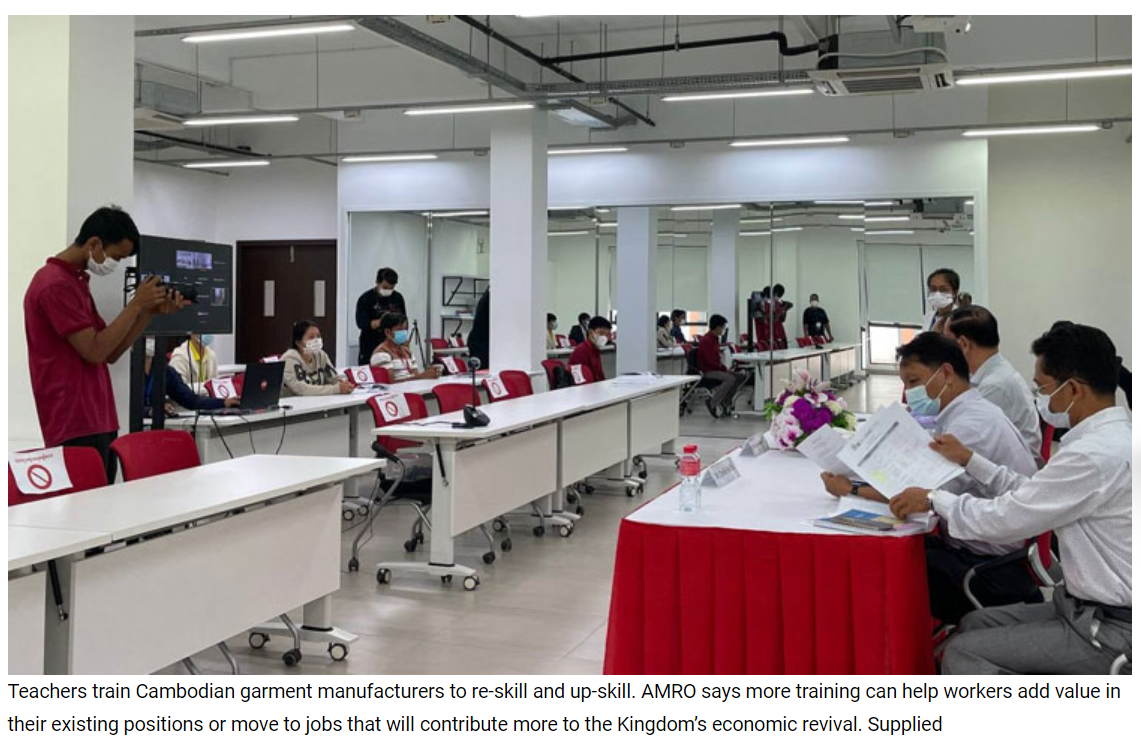Cambodia: Economy to grow 2.8 percent this year, AMRO says
Cambodia’s economy will recover from last year’s 3.1 percent contraction, according to the ASEAN+3 Macroeconomic Research Office (AMRO), after a successful vaccination campaign allowed factories to reopen and easing supply-chain bottlenecks helped increase exports.
“Recovery from the pandemic is expected to gradually gain momentum in 2021, notwithstanding a recent spike in global infections,” AMRO said. “Although the outbreak has reduced economic activity, Cambodia is projected to grow by 2.8 percent in 2021 led by a robust recovery in manufacturing, boosted by increased demand for garments and other manufactured exports as global demand rebounds,” it said in its annual consultation report on Cambodia.
There are now only an average of 47 Covid-19 infections a day in the Kingdom and 86 percent of the population has been fully vaccinated against the Coronavirus.
Prime Minister Hun Sen has declared the country fully re-open to business and the government has scrapped quarantine for fully-vaccinated visitors, allowing investors and tourists alike to return to the country but AMRO warns that, for a country so heavily reliant on tourism and a large-pool of factory workers, a resurgence of Covid could kill off the tentative recovery.
“The economy’s high reliance on contact-intensive services sector and a labour-intensive manufacturing sector renders the economic recovery more vulnerable to sudden outbreak of infection given a relatively weak public health system. Extended lockdowns and uncontrolled resurgence of infections could result in severe damages to many service businesses as well as export companies,” it said.
With large-scale lockdowns back in force across Europe and travel restrictions being tightened in China, Cambodia’s vaccination success will not necessarily ensure a tourism recovery AMRO warns.
“Given the importance of tourism in Cambodia’s economy, the significant uncertainty over the resumption of international travel presents a key risk to the growth outlook for Cambodia. Prospects for the resumption of international travel remain bleak amid the resurgence in infections and slow vaccination in many countries, as well as the emergence of more infectious variants,” it said.
In March last year the National Bank of Cambodia told all financial institutions to restructure loans to help debtors and maintain financial stability. The NBC directive allowed banks to reduce repayments, cut interest rates and extend deadlines, giving a grace period of up to six months. This is due to expire at the end of the year.
“ Given active loan restructuring by financial institutions, the differentiated recovery could lead to a further deterioration in credit quality,” AMRO said. “The difficulty in assessing the credit worthiness of restructured loans, combined with the possibility of inadequate provisioning ahead of an eventual unwinding of regulatory forbearance, could lead to a build-up of risks.”
AMRO warns that Covid could leave permanent scars on the economy unless the government and private sector provide new avenues of employment, for example by retraining people to give them the skills needed to take advantage of the booming digital economy.
“Factory and business closures have led to sizeable job losses. Unless idle resources and labour are properly redirected to sectors with growth potential, the economy’s productive capacity will decline over time and result in permanent damage,” it said.
The government expanded this year’s stimulus package from $719 million to $1.454 billion and AMRO said more spending is needed but must be targeted on training and moving workers into key industries.
“As the economic recovery gains momentum, existing short-term crisis support measures should be carefully reviewed and recalibrated to focus more on bolstering economic recovery, while ensuring continued support for priority target groups,” it said.
“For example, emergency wage subsidies could be gradually scaled back and replaced with expanded vocational and skills training programs to help displaced workers upskill and reskill. This will assist them in finding employment in productive sectors. Additional resources should also be directed to job search and matching programs to facilitate workers’ transition towards expanding sectors and to reduce frictions in the job market.”
Along with continuing fiscal stimulus AMRO recommends the NBC maintains its loose monetary policy and keeps a close eye on the state of the banking industry.
“As demand for liquidity remains elevated, accommodative policy measures should be maintained to ensure sufficient funds are available to productive sectors during the recovery. With the more accommodative financial conditions, the authorities should continue to closely monitor credit risk developments at banks, particularly those with thin capital buffers or high exposure to risky sectors,” it said.
AMRO welcomed Cambodia’s new law on investment, saying it may encourage more foreign capital to flow into priority sectors.
The Singapore-based research group also advised the government to focus on maintaining and improving its sustainable development goals of ensuring a social safety net for the poor and unemployed, investing more in healthcare and education and bringing in structural reforms to help the sectors likely to contribute most to Cambodia’s economic revival.
Source: https://www.khmertimeskh.com/50975264/economy-to-grow-2-8-percent-this-year-amro-says/


 English
English




